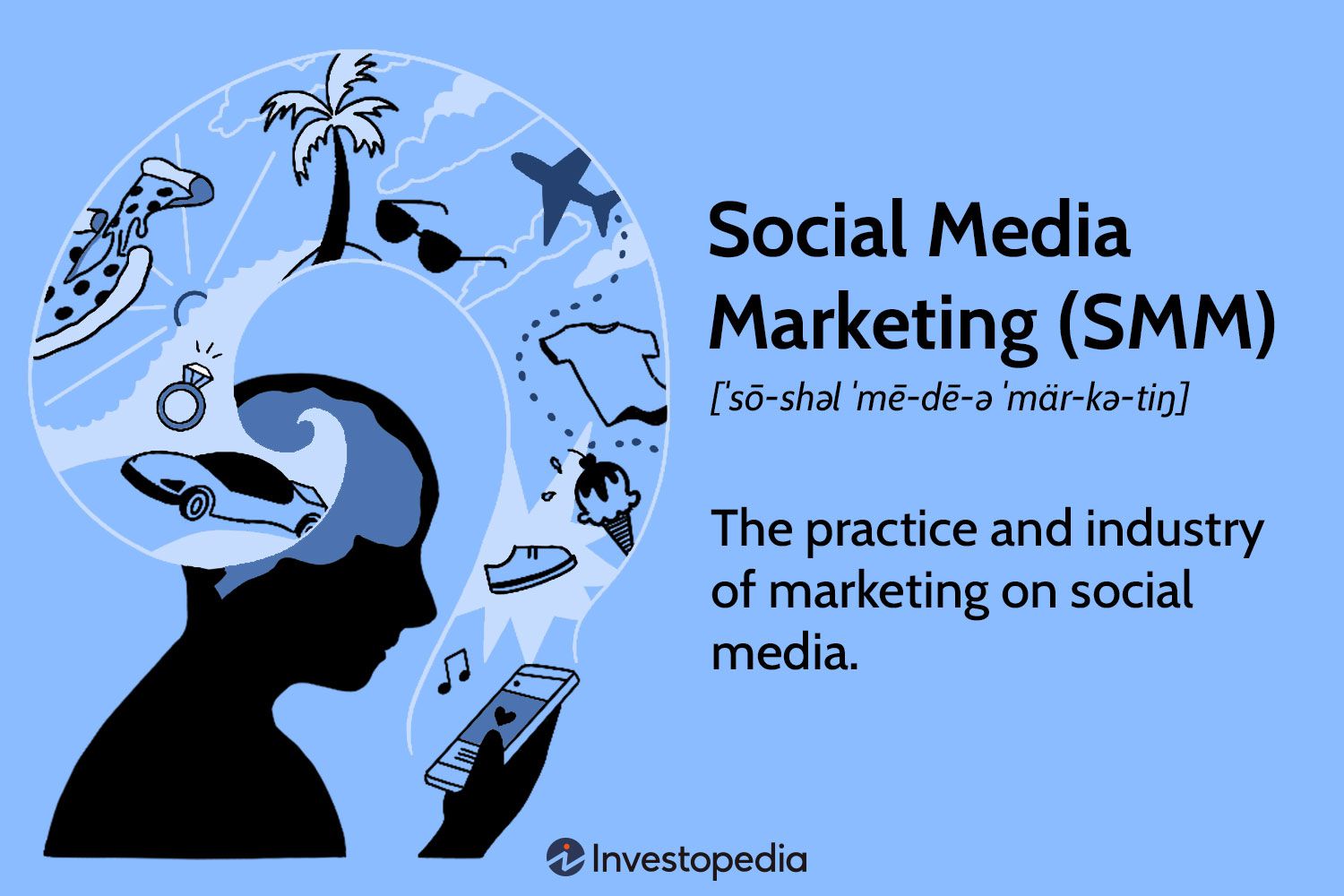Ever wondered how your favorite brands manage to grab your attention and stay on top of your mind through those colorful and engaging posts you see on your social media feeds? Well, we’ll let you in on a little secret: it’s all about having a strong social media marketing strategy! Dive deep with us as we discuss what this phenomenon is all about and the secrets behind its power.
What is Social Media Marketing? Social media marketing (SMM) is a type of digital marketing that makes use of social media platforms like Facebook, Instagram, and X platform to build brand awareness, increase sales, and drive traffic to a website. With its ability to connect with existing and potential customers, social media marketing leverages interactive and data-rich platforms for targeting and engagement, and offers valuable customer insights for marketing intelligence.
Excited to unravel the secrets of social media marketing further? Keep on reading to discover how to build a winning strategy, the importance of understanding your audience and competition, and the plethora of content and platform-specific tactics that will help your brand stand out in the digital world.
Understanding Social Media Marketing
Definition of Social Media Marketing (SMM)
Social media marketing is the process of promoting a brand and its products or services on various social networking platforms. Essentially, SMM provides businesses with a cost-effective way to reach and engage with their target audience. According to Forbes, “Social media marketing is a type of digital marketing that uses social media platforms to promote your brand and offerings to your ideal customers.”

Source: Investopedia
Variety of platforms utilized for SMM: Facebook, Instagram, X platform (formerly Twitter), etc.
There are numerous platforms available for businesses to leverage for SMM. Some popular platforms include Facebook, Instagram, X platform (formerly known as Twitter), LinkedIn, Pinterest, YouTube, and TikTok. Each platform offers unique demographics and features, allowing businesses to reach different audiences and employ various marketing tactics.
Purpose: Brand building, increasing sales, driving website traffic
The main objectives of SMM include building brand awareness, increasing sales, and driving traffic to a website. By fostering a strong presence on social media, companies can create a recognizable brand image, expand their reach, and ultimately drive conversions.
The Power of SMM
Connection with existing and potential customers
Social media allows businesses to actively engage with their existing and potential customers, fostering long-term relationships and loyalty. This direct connection helps brands better understand their customers, gather valuable feedback, and showcase their customer-centric values.
Interactive and data-rich platforms for targeting and engagement
Social media platforms are data-rich and offer many tools for targeting specific audience segments. Businesses can use these tools to create highly targeted campaigns that resonate with their ideal customers. In addition, social platforms allow for interactive content – such as polls, quizzes, and comment sections – that further encourages engagement and feedback.
Customer data insights for marketing intelligence
Social media offers a wealth of data on customer behavior and preferences that brands can use to refine their marketing efforts. By analyzing and leveraging this data, companies can gain valuable insights, identify trends, and discover new opportunities for growth.
Evolution of SMM
Historical growth from 2004 to present
The history of SMM can be traced back to the emergence of social media platforms in the early 2000s. Since then, SMM has evolved from a relatively niche marketing tactic into an essential component of modern marketing strategies. As social media has grown in popularity, so too has the importance of SMM for businesses of all sizes and industries.
Influence of SMM on modern marketing strategies
The rise of social media has had a profound impact on the way businesses approach marketing. Traditional marketing methods – such as print, radio, and television advertising – have been disrupted by the power and reach of social media. As a result, more and more companies are integrating SMM into their overall marketing strategies to stay competitive in today’s digital landscape.
The shift from standalone marketing tool to a multifaceted approach
In its early days, social media marketing was often seen as a standalone tactic used primarily for brand building. However, as social platforms have evolved and matured, SMM has become a multifaceted approach that encompasses various strategies, such as content marketing, influencer marketing, and customer service. This shift highlights the growing importance and complexity of SMM in the modern marketing ecosystem.
The Ubiquity and Challenges of SMM
Prevalence of social media in everyday life
With billions of people using social media every day, it’s no surprise that SMM has become such an essential part of modern marketing. As more and more people turn to social platforms for entertainment, communication, and shopping, businesses have a unique opportunity to reach and engage with their target audience.
The need for strategic content and community management
With so many businesses competing for attention on social media, it’s important to have a solid strategy in place. This includes creating compelling, high-quality content and effectively managing brand communities – whether it’s through responding to comments, addressing concerns, or simply interacting with followers.
The balance between effective exposure and over-saturation
As powerful as social media marketing can be, there’s a delicate balance to be struck between effective exposure and over-saturation. Saturating one’s audience with too much promotional content can lead to fatigue and disinterest, ultimately harming the brand’s reputation. To avoid this, businesses need to carefully plan their content strategy and strike the right balance between organic and promotional content.
Setting Clear Objectives
Before diving into social media marketing, it’s essential to set clear objectives that align with your overall business goals. By establishing measurable and specific objectives, you can track progress and make adjustments as needed. For each social media platform, you should have unique goals that cater to the platform’s strengths and audience preferences.
For example, if your goal is to drive traffic to your website, you might focus on link sharing and engaging captions on Instagram while utilizing eye-catching visuals and relevant hashtags on X platform. By tailoring your approach to each platform, you enhance the effectiveness of your social media marketing efforts.

Audience and Competitor Analysis
An essential aspect of social media marketing is understanding your audience. Identifying your target demographic and their preferences can help you craft content that resonates with them and drives engagement. Research their interests, behavior, and the kind of content that attracts them to ensure your content is relevant and appealing to your audience.
Monitoring your competitors and industry benchmarks can provide valuable insights into trends and best practices. By keeping an eye on your competitors’ tactics and performance, you can adjust your strategy accordingly to gain an edge in the competition. As mentioned in Sprout Social, your social media marketing strategy should include a list of your existing and planned social media accounts along with goals specific to each platform.
Content Strategy and Calendar Planning
A successful social media marketing strategy requires a diverse mix of valuable and engaging content. This could include promotional content, organic posts, educational material, or user-generated content. Developing a content calendar helps ensure a consistent posting schedule aligned with your goals.
To optimize engagement, consider when your audience is most likely to interact with your content and time your posts accordingly. It’s equally important to strike a balance between promoting your brand and sharing useful content that nurtures your audience’s interests.
Platform-Specific Strategies
Each social media platform has its unique strengths and audience behavior. For instance, visual content is crucial on platforms like Instagram, while X platform’s format works better for concise, text-based updates. By tailoring your content and interactions to each platform’s characteristics, you enhance the effectiveness of your social media marketing efforts.
In addition, utilize platform-specific features such as Instagram Stories, live videos, and shopping options that cater to your audience’s preferences and expectations. This not only improves engagement rates but also helps in creating a strong brand presence across multiple platforms.

Internal Links
Having a strong social media marketing strategy can have a significant impact on your other marketing efforts. For example, combining social media marketing and content marketing can amplify your brand’s reach and authority. Furthermore, combining social media marketing and cold emailing can help improve your targeting and lead generation processes.
In conclusion, effectively utilizing social media marketing requires understanding your audience, setting clear objectives, and tailoring your approach to optimize performance on each platform. By incorporating the aforementioned strategies, your brand can benefit from the unique advantages offered by different social media platforms and achieve desired results.
Executing and Measuring the Impact of Social Media Marketing
Content Creation and Distribution
Developing quality content that aligns with a brand’s identity is crucial for the success of any social media marketing (SMM) campaign. Companies should aim to create content in various creative formats, such as images, videos, and infographics, to capture their audience’s attention and drive engagement on their social media platforms.
Engagement tactics, such as using hashtags, collaborating with influencers or other brands, and creating interactive posts like quizzes or surveys, can help organically boost your content’s visibility to a wider audience. Distributing content across multiple platforms also increases reach and overall impact, helping to further solidify your brand’s presence online.

Community Building and Customer Interaction
Social media platforms offer brands an opportunity to foster community relationships by actively engaging with their audience. Acknowledging comments, mentions, or even just giving a simple “like,” encourages a sense of brand-community closeness, which in turn helps to build trust and loyalty.
Leveraging user-generated content (UCG) and social proof – like testimonials, reviews, or featuring a customer’s post about your product – is another effective way to build brand credibility and affinity. Additionally, facilitating customer feedback and addressing service inquiries when they arise on social platforms fosters a sense of responsiveness and accountability that consumers value.
Performance Tracking and Strategy Adjustment
Analyzing various performance metrics like engagement, reach, and conversions is essential in actively managing a successful SMM campaign. Using analytics tools, like Google Analytics or Hootsuite Insights, helps monitor and assess your current strategy and identify areas where improvements can be made.
Continuous refinement of your SMM strategy based on data and feedback ensures that your marketing efforts remain relevant and effective in accomplishing your business objectives. As the needs and preferences of your audience change over time or platform algorithms evolve, the ability to adapt your SMM strategy accordingly is vital to sustaining long-term success.
In conclusion, executing and measuring the impact of social media marketing involves creating captivating content, actively engaging with your audience, and regularly assessing your strategy’s performance to make data-driven improvements.
Frequently Asked Questions
What types of content perform best on social media platforms?
A mix of content that resonates with your target audience, elicits emotion, and serves a purpose–-either entertaining or informative–-typically performs well. High-quality and visually appealing images, videos, and infographics tend to capture more attention and engagement.
How often should I post on social media platforms?
The ideal frequency of posting varies depending on your brand’s objectives, the platform, and your audience’s preferences. Consistently posting at a rate that maintains engagement without overwhelming your followers is key. Analyzing insights data from your chosen platform will help determine the optimal posting frequency for your audience.
What are some common social media performance metrics to track?
Key performance indicators (KPIs) include likes, comments, shares, click-through rates, conversion rates, reach, and impressions. Both quantitative and qualitative metrics should be considered when assessing your SMM strategy’s overall performance.
How do I handle negative comments or feedback on social media?
Addressing negative comments in a timely and professional manner helps maintain your brand’s reputation and credibility. Provide a genuine response and offer assistance, directing the conversation to a private channel if necessary. In cases where comments are blatantly offensive or spam, you may consider deleting or hiding them from public view.
Should I use paid social media ads in addition to organic content?
Combining paid social media ads with your organic content strategy can help you reach a wider audience, target specific demographics, and increase visibility for your brand. Analyzing your campaign goals, target audience, and budget, will help you determine the appropriate balance between organic and paid content strategies.

